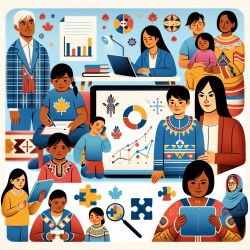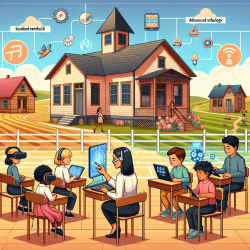Introduction
In the realm of genetic disorders, Cohen Syndrome is a rare condition characterized by developmental delays, intellectual disabilities, and distinctive facial features. Recent research has uncovered a new genetic player in the form of a biallelic BICD2 variant, which may present a novel candidate for Cohen-Like Syndrome. This discovery opens new avenues for speech-language pathologists to enhance their therapeutic approaches, particularly in online therapy settings such as those provided by TinyEYE.
The Genetic Discovery
The study, "Biallelic BICD2 Variant is a Novel Candidate for Cohen-Like Syndrome," highlights the identification of a rare homozygous missense mutation in the BICD2 gene. This mutation was found in a patient exhibiting symptoms consistent with Cohen-Like Syndrome, including intellectual disability, speech delay, and epilepsy. The research suggests that this genetic variant could be a significant contributor to the disorder, providing a new target for diagnosis and intervention.
Implications for Speech Therapy
For practitioners in speech-language pathology, understanding the genetic underpinnings of disorders like Cohen-Like Syndrome is crucial. The BICD2 variant's association with speech and language delays offers an opportunity to tailor interventions more effectively. Here are some ways practitioners can leverage this information:
- Targeted Assessments: By incorporating genetic insights into assessments, therapists can better identify the root causes of speech delays and customize their therapeutic strategies accordingly.
- Personalized Therapy Plans: Understanding the genetic basis of a child's condition allows for the development of personalized therapy plans that address specific challenges associated with BICD2-related disorders.
- Enhanced Communication with Families: Educating families about the genetic aspects of their child's condition can foster a collaborative approach to therapy, ensuring that interventions are supported at home.
Encouraging Further Research
The discovery of the BICD2 variant's role in Cohen-Like Syndrome is just the beginning. Speech-language pathologists are encouraged to stay informed about ongoing research and consider participating in studies that explore the genetic components of speech and language disorders. By contributing to the body of knowledge, practitioners can help pave the way for more effective treatments and better outcomes for children.
Conclusion
The identification of the BICD2 variant as a potential contributor to Cohen-Like Syndrome represents a significant advancement in our understanding of genetic disorders. For speech-language pathologists, this discovery offers new insights that can enhance therapeutic practices and improve outcomes for children. As we continue to unravel the genetic complexities of speech and language disorders, the importance of data-driven decisions and personalized interventions cannot be overstated.
To read the original research paper, please follow this link: Biallelic BICD2 Variant is a Novel Candidate for Cohen-Like Syndrome.










